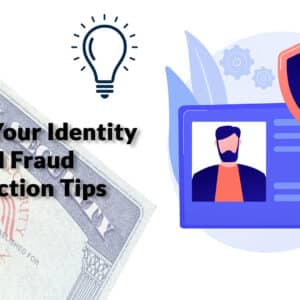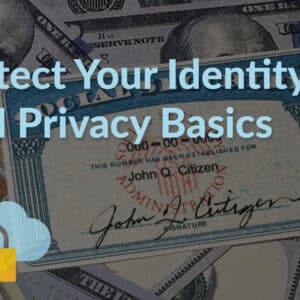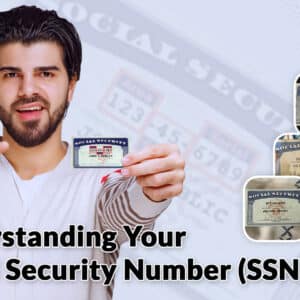Lost SSN? Here’s What You Need to Know
Nearly 60 million Americans have fallen victim to identity theft, losing $56 billion each year. If your lost ssn is in the wrong hands, you might face financial fraud and personal data loss. But don’t worry, this guide will help you understand and protect your stolen social security number.
This article will walk you through the steps to protect your identity theft protection, credit monitoring, and personal safety. You’ll learn how to report a fraud alert and security freeze. Plus, how to replace important documents and get help from identity recovery services.
By the end of this guide, you’ll know how to fight back against a stolen identity and compromised personal information. You’ll be ready to take control of your financial and personal security.
Understanding the Consequences of a Lost or Stolen Social Security Number
When your Social Security number (SSN) is lost or stolen, it can lead to big problems. Criminals might use your info to harm your finances. This can cause a lot of trouble for you.
Identity Theft Risks
Thieves can open new credit accounts with your stolen identity. They might also file fake tax returns or get into your current accounts. This can hurt your credit score a lot.
Having a bad credit score makes it hard to get loans, rent, or even find a job. Fixing your financial reputation can be very hard.
Financial Fraud Vulnerabilities
A lost or stolen SSN also puts you at risk for financial fraud. Thieves might use your info for insurance or government benefits scams. Or even for medical identity theft.
This can mess up your medical records and lead to unexpected bills. It can also ruin your financial history for years.
It’s very important to keep your SSN safe in today’s world. Identity theft and financial fraud can have serious effects. So, always be careful and act fast to protect your info.
Immediate Steps to Take When Your SSN is lost ssn
If you find out your social security number (SSN) is lost or stolen, act fast. It’s key to protect yourself from identity theft and fraud.
Here are the steps you should take right away:
- Contact the major credit bureaus (Equifax, Experian, and TransUnion) and request a fraud alert. This makes it tough for someone to open new accounts in your name.
- Report the incident to the Federal Trade Commission (FTC) by visiting IdentityTheft.gov or calling 1-877-438-4338. They can help you with a recovery plan.
- Get a free copy of your credit report from each of the three major credit bureaus. Check for any suspicious activity at AnnualCreditReport.com.
- Consider a credit freeze to limit access to your credit report. This makes it harder for thieves to open new accounts.
- If you know where your SSN was lost or stolen, report it to the right authorities or organizations.
Acting quickly and taking these steps can help reduce the damage from identity theft. It gives you the tools to protect your credit and personal info.
Remember, protecting your identity and replacing documents are your main goals when your SSN is stolen. Quick action helps minimize risks and keeps your personal info safe.
Reporting a Lost or Stolen Social Security Number
If your Social Security number (SSN) is lost or stolen, act fast. This is to protect yourself from identity theft and financial fraud. The first thing to do is report the incident to the right authorities.
Contacting the Authorities
Here’s what you need to do when your SSN is lost or stolen:
- Contact the Social Security Administration (SSA) to get a new Social Security card. You can do this online, by phone, or in person at a local SSA office.
- File a report with your local police or sheriff’s department. Give them all the details about losing or having your SSN stolen.
- Also, reach out to the Federal Trade Commission (FTC) to report identity theft. They can help you protect your credit and personal info. The FTC’s IdentityTheft.gov website is a great resource for victims.
Telling the right authorities about your lost or stolen SSN is key. It helps stop misuse of your personal info and reduces the risk of identity theft and fraud.
By following these steps, you can protect your identity and credit. This ensures any misuse of your SSN is caught and handled quickly.
Protecting Your Credit and Identity
Keeping your credit and identity safe is key in today’s digital world. To protect your personal info, sign up for a trusted credit monitoring service. These services alert you to any odd activity on your credit report. This lets you tackle identity theft issues fast.
Also, you can protect your identity by setting up fraud alerts or security freezes on your credit files. A fraud alert makes creditors check your identity before opening new accounts. A security freeze blocks access to your credit report, making it hard for thieves to open accounts in your name.
Credit Monitoring Services
Credit monitoring services watch your credit reports for odd activity. They spot signs of identity theft, like unauthorized credit checks or new accounts. By knowing this, you can act fast to protect your finances.
Fraud Alerts and Security Freezes
- Fraud alerts flag your credit file, making creditors verify your identity before giving new credit.
- Security freezes block access to your credit report, making it tough for thieves to open new accounts.
Using these steps can greatly lower the chance of credit monitoring services, fraud alerts, and security freezes being used for identity theft and fraud.
Replacing Lost or Stolen Documents
You might need to replace more than just your Social Security card. This includes your driver’s license, passport, or financial account details. Learning how to replace these documents quickly is key to protecting your personal info and stopping misuse.
Time is critical when it comes to document replacement. Acting fast helps prevent identity theft protection issues and stops stolen identity misuse.
- Contact the issuing agency or organization to report the lost or stolen document.
- Provide the necessary information, such as your personal details and the last known location of the document.
- Follow the agency’s instructions to begin the replacement process, which may involve completing forms, providing proof of identity, and paying any required fees.
- Monitor your credit reports and financial accounts closely to ensure no unauthorized activities have occurred.
- Consider enrolling in a identity theft protection service to safeguard your personal information going forward.
Acting quickly to replace lost or stolen documents is a proactive step. It helps protect your identity and financial health. The sooner you take action, the more you can safeguard your personal and financial security.
Identity Recovery Services and Support
If you’ve been a victim of identity theft or fraud, there are services to help you. They offer identity recovery services and support. These services help you get your personal and financial life back on track.
Professional Assistance for Victims
Having your stolen identity can be very stressful. It’s hard to deal with the complex steps of identity theft protection and recovery. But, there are experts ready to help you.
They can assist you in many ways. They help with:
- Contacting credit bureaus and creditors to dispute fraudulent accounts
- Reporting the identity theft to the right authorities
- Getting new documents, like a Social Security card or driver’s license
- Creating a plan to fix your credit and finances
- Offering emotional support and guidance
With these services, you can take back control of your identity theft protection. They help you avoid more financial and personal harm.
Preventive Measures for Safeguarding Your Personal Information
While this guide helps you deal with a lost or stolen Social Security number (SSN), it’s key to take steps ahead of time. Shredding sensitive documents and using strong passwords are just a few ways to protect yourself. These actions can greatly lower your risk of identity theft and financial fraud.
Best Practices for Document and Data Security
Keeping your personal documents and digital data safe is vital. Here are some best practices to add to your daily routine:
- Shred sensitive documents before throwing them away, like bills and bank statements. Make sure they don’t have your SSN or personal info.
- Use strong, unique passwords for all online accounts. Also, use two-factor authentication when you can to add more security.
- Be careful when sharing your SSN or personal data. Only give it out when you really have to.
- Regularly check your credit reports for any unauthorized activities or new accounts in your name.
- Keep your computer and mobile devices safe with the latest antivirus software and updates.
By following these preventive measures, you can greatly improve your document and data security. This will help protect you from identity theft protection if your identity is stolen.
Legal Recourse for Identity Theft and Fraud
If you’ve been a victim of identity theft or financial fraud, you might have legal ways to fight back. The legal world can seem scary, but knowing your rights is key. It helps protect your money and personal info.
Filing a police report is a good first step. It creates a record of the crime. This can help in legal battles later on. It also helps clear up any false charges on your credit report.
- File a police report: Get a copy for your records and to share with authorities.
- Contact the Federal Trade Commission (FTC): They can help with recovering from identity theft and guide you on legal steps.
- Pursue civil litigation: You might sue the person who stole your identity to get back what you lost.
- Cooperate with authorities: Help law enforcement and government agencies solve the crime.
Keep in mind, the legal steps you can take depend on your case. Always talk to a lawyer who can give you the best advice for your situation.
By taking action and looking into legal options, you can fight for justice. You can also start to get your life back after identity theft or fraud.
The Emotional Impact of a Compromised SSN
Losing your Social Security number can really affect you emotionally. You might feel overwhelming anxiety, a sense of violation, and a loss of security and control. The emotional impact of a compromised SSN and stolen identity can be deep and last a long time.
Being a victim of identity theft can make you feel powerless and vulnerable. The stress of fixing your financial and personal life can be very tiring. It’s important to find support during this hard time to help you feel stable and secure again.
- Reach out to trusted friends and family members for emotional support.
- Consider seeking professional counseling or joining a support group for victims of identity theft and financial fraud.
- Contact victim assistance organizations, which can provide valuable resources and guidance to help you through the recovery process.
By recognizing the emotional impact and taking steps to address it, you can start to regain a sense of control and move forward with the restoration of your identity and financial well-being. Remember, you are not alone in this journey, and there are resources and support available to help you navigate this difficult experience.
Restoring Your Financial and Personal Well-being
Recovering from lost or stolen Social Security numbers is tough. But, with the right steps and help, you can take back control. This journey to fix your identity might take time. Yet, by following this guide and using available help, you can feel confident again.
The first thing to do is tackle the immediate problems. This means talking to creditors, reporting the theft, and watching your credit for fraud. These actions help limit the damage and start your recovery.
Seeking professional help is key when dealing with identity theft. Identity theft recovery services offer the support you need. They help with legal and financial issues, like fixing your credit and protecting your info.
Don’t forget about your mental health during this tough time. The emotional toll of a stolen Social Security number is real. Taking care of yourself and getting counseling can help. This way, you can focus on fixing your financial situation.
Recovering from a lost or stolen Social Security number is a long journey. But, with determination and the right help, you can get your identity back. By using the support available, you can come out of this stronger, with both financial well-being and personal well-being.
Conclusion
Losing your Social Security number is a big deal. But, with the right steps, you can protect yourself from identity theft and financial fraud. Knowing what to do and using the right resources can help you keep your personal information safe.
From reporting a lost or stolen Social Security number to protecting your credit, this article has you covered. You can use fraud alerts, get document replacements, and access identity recovery services. These tools are here to help you get back on track.
Don’t underestimate the seriousness of a lost or stolen Social Security number. But, with the right actions and determination, you can get through it. Use the available resources, stay alert, and protect your personal data. This way, you can prevent the lasting effects of identity theft and financial fraud.








Add comment